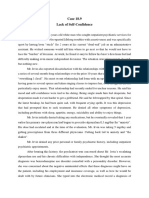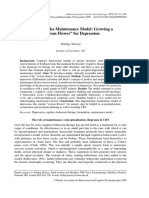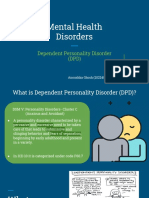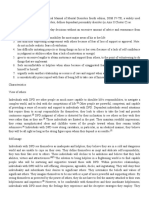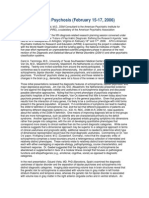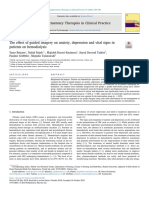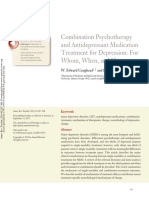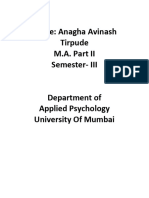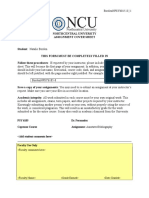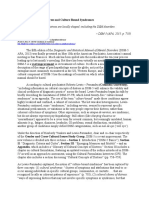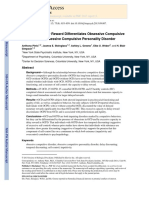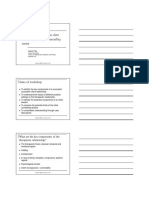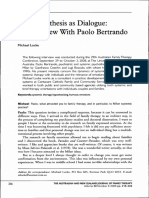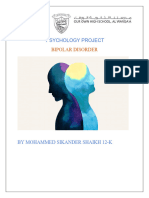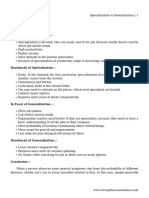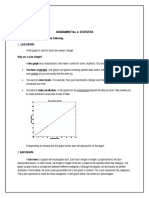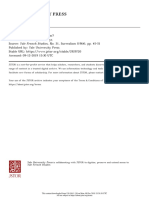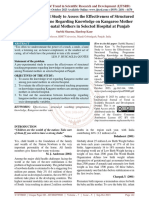Dependent Personality Disorder
Dependent Personality Disorder
Uploaded by
RanaAdnanShafiqueCopyright:
Available Formats
Dependent Personality Disorder
Dependent Personality Disorder
Uploaded by
RanaAdnanShafiqueCopyright
Available Formats
Share this document
Did you find this document useful?
Is this content inappropriate?
Copyright:
Available Formats
Dependent Personality Disorder
Dependent Personality Disorder
Uploaded by
RanaAdnanShafiqueCopyright:
Available Formats
2012
DEPENDENT PERSONALITY DISORDER
AssignmentNo:3
1105033 ranaadnanshafique@live.com 1/1/2012
DEPENDENT PERSONALITY DISORDER
There are an endless amount of disorders that psychologists have to deal with everyday in their line of work. Some of these disorders can be treated fairly easy, others might be incurable or very hard to handle. There are some disorders that can harm the person or even other people. This is why it is important to know a small portion about some common disorders. In this essay, dependent personality disorder (DPD) will be discussed. I will discuss the symptoms, the effects on relationships, the way people with the disorder look at others and themselves, and what drug abuse does to this kind of individual..Dependent personality disorder (DPD), formerly known as asthenia personality disorder is a personality disorder that is characterized by a pervasive psychological dependence on other people. This personality disorder is a long-term (chronic) condition in which people depend too much on others to meet their emotional and physical needs.
The difference between a 'dependent personality' and a 'dependent personality disorder' is somewhat subjective, which makes diagnosis sensitive to cultural influences such as gender role expectations. Individuals with DPD see other people as much more capable to shoulder life's responsibilities, to navigate a complex world, and to deal with the competitions of life. Other people are powerful, competent, and capable of providing a sense of security and support to individuals with DPD. Dependent individuals avoid situations that require them to accept responsibility for themselves; they look to others to take the lead and provide continuous support.DPD judgment of others is distorted by their inclination to see others as they wish they were rather than as they are. These individuals are fixated in the past. They maintain youthful impressions; they retain unsophisticated ideas and childlike views of the people toward whom they remain totally submissive. Individuals with DPD view strong caretakers, in particular, in an idealized manner; they believe they will be all right as long as the strong figure upon whom they depend is accessible. Individuals with DPD see relationships with significant others as necessary for survival. They do not define themselves as able to function independently; they have to be in supportive relationships to be able to manage their lives. In order to establish and maintain these life-sustaining relationships, people with DPD will avoid even covert expressions of anger. They will be more than meek and docile; they will be admiring, loving, and willing to give their all. They will be loyal, unquestioning, and affectionate. They will be tender and considerate toward those upon whom they depend. Dependent individuals play the inferior role to the superior other very well; they communicate to the dominant people in their lives that they are useful, sympathetic, strong, and competent. With these methods, individuals with DPD are often able to get along with unpredictable or isolated people. To further make this possible, individuals with DPD will approach both their own and others' failures and shortcomings with a saccharine attitude and indulgent tolerance. They will engage in a mawkish minimization, denial, or distortion of both their own and others' negative, self-
defeating, or destructive behaviors to sustain an idealized, and sometimes fictional, story of the relationships upon which they depend. They will deny their individuality, their differences, and ask for little other than acceptance and support. Not only will individuals with DPD subordinate their needs to those of others, they will meet unreasonable demands and submit to abuse and intimidation to avoid isolation and abandonment. Dependent individuals so fear being unable to function alone that they will agree with things they believe are wrong rather than risk losing the help of people upon whom they depend. They will volunteer for unpleasant tasks if that will bring them the care and support they need. They will make extraordinary self-sacrifices to maintain important bonds. It is important to note that individuals with DPD, in spite of the intensity of their need for others, do not necessarily attach strongly to specific individuals, i.e., they will become quickly and indiscriminately attached to others when they have lost a significant relationship. It is the strength of the dependency needs that is being addressed; attachment figures are basically interchangeable. Attachment to others is a self-referenced and, at times, haphazard process of securing the protection of the most readily available powerful other willing to provide nurturance and care. Both DPD and HPD are distinguished from other personality disorders by their need for social approval and affection and by their willingness to live in accord with the desires of others. They both feel paralyzed when they are alone and need constant assurance that they will not be abandoned. Individuals with DPD are passive individuals who lean on others to guide their lives. People with HPD are active individuals who take the initiative to arrange and modify the circumstances of their lives. They have the will and ability to take charge of their lives and to make active demands on others. No studies of genetics or of biological traits for dependents have been conducted. Central to their psychodynamic constellation is an insecure form of attachment to others, which may be the result of clinging parental behavior. There is little evidence to suggest that the use of medication will result in long-term benefits in the personality functioning of individuals with DPD. DPD is not amenable to pharmacological measures; treatment relies upon verbal therapies.
You might also like
- Cognitive Therapy For Personality Disorders - BeckDocument528 pagesCognitive Therapy For Personality Disorders - BeckJaviera BuzetaNo ratings yet
- Case 18Document3 pagesCase 18Desti Oki Lestari0% (1)
- The Six Cycles Maintenance Model Growing A Vicious Flower For DepressionDocument12 pagesThe Six Cycles Maintenance Model Growing A Vicious Flower For DepressionDIANA SPRINCEANUNo ratings yet
- Therapy Does Not Include SexDocument26 pagesTherapy Does Not Include SexCori StaymakingMoneyNo ratings yet
- Us and The Archaeology of Greek PoetryDocument220 pagesUs and The Archaeology of Greek Poetrymarzodeliebre100% (2)
- Dependent Personality DisorderDocument14 pagesDependent Personality DisorderPalak GuptaNo ratings yet
- Dependent Personalitz D.Document6 pagesDependent Personalitz D.Psihoterapeut Simona Criveanu100% (1)
- Unit 3Document16 pagesUnit 3husnasohail486No ratings yet
- Dependent Personality DisorderDocument11 pagesDependent Personality DisorderMariz Joy Gonzales GuillermoNo ratings yet
- Deconstructing PsychosisDocument8 pagesDeconstructing PsychosisEvets DesouzaNo ratings yet
- PTSDDocument17 pagesPTSDadrianaNo ratings yet
- Locus of Control and Its Influence On Health Related Help Seeking Behavior in NepalDocument8 pagesLocus of Control and Its Influence On Health Related Help Seeking Behavior in NepalDristy GurungNo ratings yet
- Borderline Personality Disorder LancetDocument11 pagesBorderline Personality Disorder Lancetkskpsych100% (2)
- Dissociative Identity Disorder 1Document8 pagesDissociative Identity Disorder 1Sneha Mariya JoshyNo ratings yet
- F6 Disorder of Adult Personality and BehaviourDocument128 pagesF6 Disorder of Adult Personality and BehaviourNeuro PsikiNo ratings yet
- The Effect of Guided Imagery On Anxiety, Depression and Vital Signs in Patients On HemodialysisDocument7 pagesThe Effect of Guided Imagery On Anxiety, Depression and Vital Signs in Patients On HemodialysisdhaifahinayhNo ratings yet
- Cultural Issue Schizophrenia IndiaDocument58 pagesCultural Issue Schizophrenia IndiaSam InvincibleNo ratings yet
- Dissociative Disorder, Somatic Symptoms and Related DisorderDocument49 pagesDissociative Disorder, Somatic Symptoms and Related DisorderAlliyah PimentelNo ratings yet
- The Lying Truths of Psychiatry PDFDocument19 pagesThe Lying Truths of Psychiatry PDFAditya SinghNo ratings yet
- Circular "Questioning" in Organizations: Discovering The Patterns That Connect Bella Borwick, D.L. PsychDocument11 pagesCircular "Questioning" in Organizations: Discovering The Patterns That Connect Bella Borwick, D.L. PsychWangshosanNo ratings yet
- Bipolar Disorder in Children and Adolescents An Update On DiagnosisDocument12 pagesBipolar Disorder in Children and Adolescents An Update On DiagnosisLAURA FRITSCHE GARCIANo ratings yet
- Dissociative BehaviorDocument5 pagesDissociative BehaviorDump AccNo ratings yet
- Combination PsychotherapyDocument37 pagesCombination PsychotherapyElija MansonNo ratings yet
- (Psychoanalytic Inquiry Book Series) Frank M. Lachmann - Transforming Narcissism - Reflections On Empathy, Humor, and Expectations-Routledge (2007) - 2Document296 pages(Psychoanalytic Inquiry Book Series) Frank M. Lachmann - Transforming Narcissism - Reflections On Empathy, Humor, and Expectations-Routledge (2007) - 2JOHN JACKSON ARVELO LINARESNo ratings yet
- Human Sexuality and Sexual DisordersDocument42 pagesHuman Sexuality and Sexual DisordersAbdul Gafoor Fahmy100% (1)
- Dependent Personality Disorder - A Review of Etiology and TreatmenDocument12 pagesDependent Personality Disorder - A Review of Etiology and TreatmenTonia LoizidouNo ratings yet
- Metacognitive TherapyDocument9 pagesMetacognitive TherapyanaghaNo ratings yet
- L3 Chapter 3 - Classification of Mental Disorders, SchizophreniaDocument12 pagesL3 Chapter 3 - Classification of Mental Disorders, SchizophreniaHui Li TehNo ratings yet
- Fleming (2014) Pilot Randomized Controlled Trial of Dialectical Behavior Therapy Group Skills Training For ADHDDocument12 pagesFleming (2014) Pilot Randomized Controlled Trial of Dialectical Behavior Therapy Group Skills Training For ADHDjuanNo ratings yet
- Clinical Case Studies 2007 Townend 443 53Document12 pagesClinical Case Studies 2007 Townend 443 53cioaca12No ratings yet
- Dependent Personality Inventory-Revised (DPI-R) - Incorporating ADocument85 pagesDependent Personality Inventory-Revised (DPI-R) - Incorporating AMELISA ZELEDONNo ratings yet
- Autism: French Psychoanalysis Reported As "Cult-Like" To A French Government's Body by Autism Rights WatchDocument2 pagesAutism: French Psychoanalysis Reported As "Cult-Like" To A French Government's Body by Autism Rights WatchAutismRightsWatchNo ratings yet
- DSM 5 Clinical Cases - Schizophrenia and Other Psychotic DisordersDocument20 pagesDSM 5 Clinical Cases - Schizophrenia and Other Psychotic DisordersAlexandra MurdyNo ratings yet
- Goodman, A. (1993) - The Addictive Process.Document10 pagesGoodman, A. (1993) - The Addictive Process.Sergio Ignacio VaccaroNo ratings yet
- Autistic Burnout Vs Depression - Insights of A Neurodivergent ClinicianDocument4 pagesAutistic Burnout Vs Depression - Insights of A Neurodivergent ClinicianAna Júlia AraújoNo ratings yet
- Psychoanalytic Theories of PersonalityDocument29 pagesPsychoanalytic Theories of PersonalityAdriana Bogdanovska ToskicNo ratings yet
- Reflection On The Experience of Privilege and Oppression Growing Up As A Member of Mita Congregation in Puerto Rico.Document14 pagesReflection On The Experience of Privilege and Oppression Growing Up As A Member of Mita Congregation in Puerto Rico.Brenda Liz Ruiz-GarcíaNo ratings yet
- Relational Withdrawal SchizoidDocument16 pagesRelational Withdrawal Schizoidmeditationinstitute.netNo ratings yet
- PSY 6105 Dr. Fernandez Capstone Course Assignment: Annotated BibliographyDocument5 pagesPSY 6105 Dr. Fernandez Capstone Course Assignment: Annotated BibliographyNatalie BordenNo ratings yet
- DEPERSONALIZATIONDocument4 pagesDEPERSONALIZATION2100428No ratings yet
- 18 Early Schemas DefinedDocument4 pages18 Early Schemas DefinedScribd AccountNo ratings yet
- Explorations in The Uses of Language in PsychotherapyDocument16 pagesExplorations in The Uses of Language in PsychotherapyHind Rifai100% (1)
- Personality DisordersDocument21 pagesPersonality DisordersRumaNo ratings yet
- OCPDDocument3 pagesOCPDNur Arina DayanaNo ratings yet
- Depersonalisation Disorder: A Contemporary OverviewDocument12 pagesDepersonalisation Disorder: A Contemporary OverviewPNo ratings yet
- Lecture No. 2 Semiology of Psychiatry Part 1Document33 pagesLecture No. 2 Semiology of Psychiatry Part 1ozgur.yonlukNo ratings yet
- Cultural Concepts of Distress and Culture Bound SyndromesDocument9 pagesCultural Concepts of Distress and Culture Bound SyndromesJas BNo ratings yet
- Capacity To Delay Reward OCD Vs OCPD PDFDocument16 pagesCapacity To Delay Reward OCD Vs OCPD PDFIrianto YapNo ratings yet
- Establishing The Counsellor-Client Relationship in The First Counselling Session SessionDocument8 pagesEstablishing The Counsellor-Client Relationship in The First Counselling Session Sessionsagar bagulNo ratings yet
- The Hypothesis As Dialogue: An Interview With Paolo BertrandoDocument12 pagesThe Hypothesis As Dialogue: An Interview With Paolo BertrandoFausto Adrián Rodríguez LópezNo ratings yet
- Bipolar DisorderDocument20 pagesBipolar Disorderabk52166No ratings yet
- Mental Health Case StudyDocument10 pagesMental Health Case Studyapi-403115643No ratings yet
- The LGBQ Microaggressions On Campus Scale A Scale Development and Validation Study Woodford2015Document29 pagesThe LGBQ Microaggressions On Campus Scale A Scale Development and Validation Study Woodford2015Salman Tahir100% (1)
- Identifying and Unde by Elsa F. Ro WWW Bookfind BizDocument310 pagesIdentifying and Unde by Elsa F. Ro WWW Bookfind BizAbad Caro100% (1)
- Mental Health Research PaperDocument12 pagesMental Health Research Paperapi-549190307No ratings yet
- Transforming the Legacy: Couple Therapy with Survivors of Childhood TraumaFrom EverandTransforming the Legacy: Couple Therapy with Survivors of Childhood TraumaNo ratings yet
- Ethical Issues in Clinical Forensic PsychiatryFrom EverandEthical Issues in Clinical Forensic PsychiatryArtemis IgoumenouNo ratings yet
- The Therafields Psychotherapy Community: Promise, Betrayal, and DemiseFrom EverandThe Therafields Psychotherapy Community: Promise, Betrayal, and DemiseNo ratings yet
- Innovations in Psychiatry: Developing the Future of Mental Health: The Human Mind: A Comprehensive Approach to Psychiatry Across the LifespanFrom EverandInnovations in Psychiatry: Developing the Future of Mental Health: The Human Mind: A Comprehensive Approach to Psychiatry Across the LifespanNo ratings yet
- How I Healed from Narcissistic Abuse by Understanding Universal Laws: 1, #1From EverandHow I Healed from Narcissistic Abuse by Understanding Universal Laws: 1, #1Rating: 5 out of 5 stars5/5 (1)
- Dial It Down: A Wellness Approach for Addressing Post-Traumatic Stress in Veterans, First Responders, Healthcare Workers, and Others in This Uncertain WorldFrom EverandDial It Down: A Wellness Approach for Addressing Post-Traumatic Stress in Veterans, First Responders, Healthcare Workers, and Others in This Uncertain WorldNo ratings yet
- Applied Mechanics (AE, CE, CH, FG, ME, PT)Document9 pagesApplied Mechanics (AE, CE, CH, FG, ME, PT)Pramod DhaigudeNo ratings yet
- Bergey'S Manual Classification of BacteriologyDocument7 pagesBergey'S Manual Classification of BacteriologyItsMeAffaNo ratings yet
- 32 Teaching Strategies in MathDocument15 pages32 Teaching Strategies in MathLeslye Somarriba PinedaNo ratings yet
- Verbal 0116 TC & SE3Document4 pagesVerbal 0116 TC & SE3Erica SongNo ratings yet
- Specialization Vs Generalization PDFDocument3 pagesSpecialization Vs Generalization PDFRAAJARSHE PRAKAASH GUPTANo ratings yet
- Baylor Graduate Catalog 2013-2014Document504 pagesBaylor Graduate Catalog 2013-2014theapguyNo ratings yet
- 238wang PressDocument148 pages238wang PressAnonymous 3fZJzWNo ratings yet
- EAPP Critique PaperDocument14 pagesEAPP Critique PaperJhude JosephNo ratings yet
- Fiber Optics LabDocument102 pagesFiber Optics LabVirendra KumarNo ratings yet
- About Beign ALONE.... C.G.JungDocument3 pagesAbout Beign ALONE.... C.G.JungCristiNo ratings yet
- The BrainsDocument2 pagesThe BrainsAdnan SohailNo ratings yet
- What Is Hyper PoetryDocument15 pagesWhat Is Hyper PoetryRoxanne PabicoNo ratings yet
- Curriculum EvaluationDocument28 pagesCurriculum EvaluationJason DemonteverdeNo ratings yet
- Public International Law Case Digests Week 2Document22 pagesPublic International Law Case Digests Week 2Fedencio Costuna100% (3)
- Assignment No. 2-Statistics: A. Give at Least On Example of The FollowingDocument6 pagesAssignment No. 2-Statistics: A. Give at Least On Example of The FollowingPatrick GarciaNo ratings yet
- Salesforce Certified Administrator-Exam GuideDocument6 pagesSalesforce Certified Administrator-Exam GuiderohitjandialNo ratings yet
- Domestic and External Debt: 8.1 OverviewDocument19 pagesDomestic and External Debt: 8.1 OverviewMuhammad Hasnain YousafNo ratings yet
- My Project SlidesDocument23 pagesMy Project SlidesAnonymous XrXVPTrNo ratings yet
- Source of Tribal History and The Contribution of AdivasisDocument8 pagesSource of Tribal History and The Contribution of Adivasislejaca2792No ratings yet
- Crossing The BarDocument21 pagesCrossing The BarAkash Deep TyagiNo ratings yet
- Exp 5Document5 pagesExp 5samama khanNo ratings yet
- Navamsa Chart of My Kundali - QuoraDocument2 pagesNavamsa Chart of My Kundali - Quorasecta OfireNo ratings yet
- Rimbaud, Father of Surrealism. BaysDocument8 pagesRimbaud, Father of Surrealism. BaysAndrea M. Guardia H.No ratings yet
- 36S17T0 Diff - 4WD Diagnosis and Repair - REFDocument64 pages36S17T0 Diff - 4WD Diagnosis and Repair - REFmanahuja100% (1)
- G3 Station User Manual en Rev02Document35 pagesG3 Station User Manual en Rev02Clayton MartinezNo ratings yet
- Courses For The First Semester, AY 2015-2016Document4 pagesCourses For The First Semester, AY 2015-2016ComDept AteneoNo ratings yet
- Roan v. GonzalesDocument2 pagesRoan v. GonzalesMoon BeamsNo ratings yet
- Page References: "#/#" Is Player's Basic Rules/Players Handbook, "DM" Is DM Basic Rules, "Alpg" Is Adventurers League Players GuideDocument2 pagesPage References: "#/#" Is Player's Basic Rules/Players Handbook, "DM" Is DM Basic Rules, "Alpg" Is Adventurers League Players GuideDominic RichardNo ratings yet
- A Pre Experimental Study To Assess The Effectiveness of Structured Teaching Programme Regarding Knowledge On Kangaroo Mother Care Among Post Natal Mothers in Selected Hospital at PunjabDocument3 pagesA Pre Experimental Study To Assess The Effectiveness of Structured Teaching Programme Regarding Knowledge On Kangaroo Mother Care Among Post Natal Mothers in Selected Hospital at PunjabEditor IJTSRDNo ratings yet

